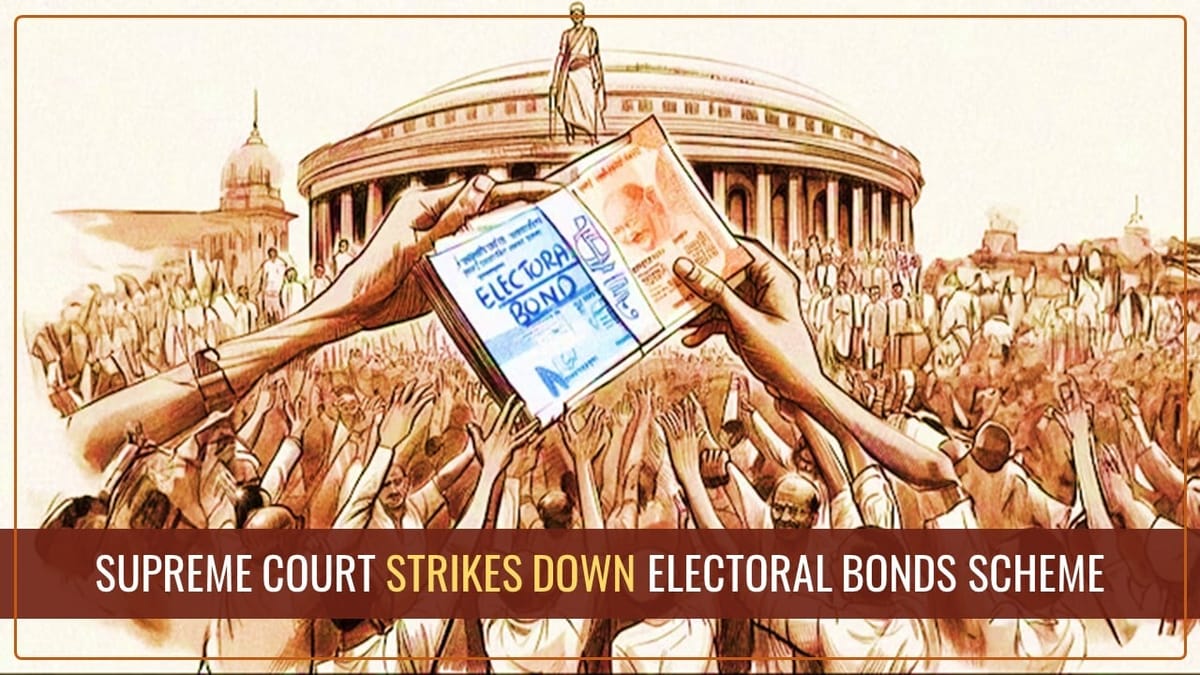Reetu | Feb 15, 2024 |

Supreme Court strikes down Electoral Bonds Scheme as ‘Unconstitutional’
The Supreme Court ruled on Thursday that the electoral bonds scheme is “unconstitutional” in a landmark decision.
It has issued a unanimous decision on a series of petitions challenging the legality of the central government’s electoral bond scheme, which allowed for anonymous funding of political parties.
A five-judge Constitution bench led by Chief Justice DY Chandrachud ruled that the anonymous electoral bonds scheme violates the right to information under Article 19(1)(a). On November 2, last year, the bench reserved its decision in the matter.
The Supreme Court stated that political parties are relevant components in the election process, and information about political party finance is essential for electoral choices. The court further asked the State Bank of India (SBI) not to issue any more of these bonds.
The decision is considered as a setback for the Bharatiya Janata Party, which has benefited the most from the system implemented in 2017.
The Supreme Court ordered the SBI to provide the Election Commission with information on electoral bonds purchased from April 12, 2019.
“In a very significant judgment which will have a long-term effect on our electoral democracy, the Supreme Court has struck down the electoral bonds plan and all of the measures that were made to bring it into force in the income tax act, the Companies Act, and so on, in a landmark decision that will have long-term consequences for our political system. They have determined that this violates citizens’ fundamental right to know who is providing this much money to political parties.” Advocate Prashant Bhushan briefed reporters on the Supreme Court’s decision.
The scheme, which was announced by the government on January 2, 2018, was positioned as an alternative to cash donations to political parties as part of attempts to increase openness in political fundraising.
The scheme’s provisions allow any Indian individual or organization incorporated or created in the nation to purchase electoral bonds. Individuals can purchase electoral bonds on their own or with others.
Only political parties registered under Section 29A of the Representation of the People Act, 1951, with at least 1% of the votes cast in the previous Lok Sabha or state legislative assembly elections were eligible to acquire electoral bonds.
According to the notification, an eligible political party may only cash electoral bonds through an authorised bank account.
In April 2019, the Supreme Court declined to stay the electoral bonds scheme, stating that it would hold an in-depth hearing on the petitions because the Centre and the Election Commission had raised “weighty issues” that had “tremendous bearing on the sanctity of the electoral process in the country”.
On October 31, last year, the Constitution bench, which also included Justices Sanjiv Khanna, BR Gavai, JB Pardiwala, and Manoj Misra, began hearing arguments on the four petitions, which were filed by Congress leader Jaya Thakur, the Communist Party of India (Marxist), and the NGO Association for Democratic Reforms (ADR).
During the hearing, the Supreme Court emphasized the need to reduce the monetary component of the political process.
In case of any Doubt regarding Membership you can mail us at contact@studycafe.in
Join Studycafe's WhatsApp Group or Telegram Channel for Latest Updates on Government Job, Sarkari Naukri, Private Jobs, Income Tax, GST, Companies Act, Judgements and CA, CS, ICWA, and MUCH MORE!"